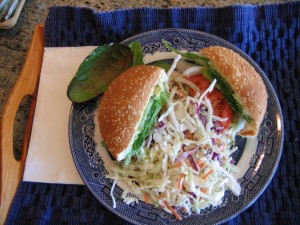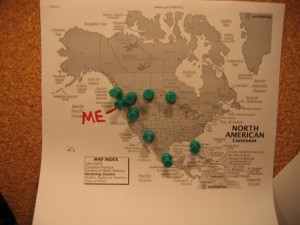For my dinner on Wednesday, I had Salmon burgers with organic Coleslaw from BC. Although many ingredients went into the burger, I would like to focus on two in particular that I feel haven’t been covered in my previous blog posts (for example, I have already gone into where the brand of bread I buy comes from, and the other ingredients have come from places I’ve already mentioned). Those two items of interest for me are the salmon burger itself and the avocado that I put on the burger.
The avocado I felt was important to mention because it is definitely the most regular food I buy that is not from Canada or the United States. The Avocado I bought is from Mexico, and has been exceedingly difficult to find out about its growing methods of production process online. I wonder if this is because there hasn’t been as much domestic pressure on Mexican produce companies by consumers to give a detail account of the seed to plate journey of their product. Often the videos I encountered of North American farms had a defensive feel to them, as if they were being made to try and satisfy a critical sentiment of the current agricultural process.
The second ingredient that I wanted to look into was the salmon burger, which I bought as a special item from the fish counter at Finest At Sea. The store boasts that all of its products are wild and ocean wise. Given that the fish were gutted, processed, and made in the shop, essentially no packaging was required for the burgers. This means that essentially the only fuel used for fish production, if it is wild, local and not factory processed, is from transportation. The salmon were caught along the coast of Vancouver island, most likely near the Broughten Archipelago.
Due to the varying conditions of the sea and greater variation in commercial boats and motors, it is very difficult to accurately measure the oil consumption of a fishing boat[1].
However, given that the fish is wild and doesn’t need any human inputs to grow, as well as its close proximity to my location and the minimal processing it had to go through, I would conclude that salmon uses less oil than the turkey that I looked into for my lunch post.
Here is my final updated maps of the world. I was lucky enough to keep all of my food products in North America for 24 hours!
[1] “ Calculating Fuel Consumption”, http://www.boatingmag.com/skills/calculating-fuel-consumption



2 responses to “Dinner”